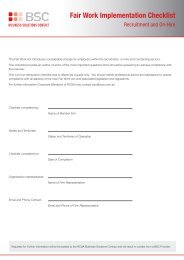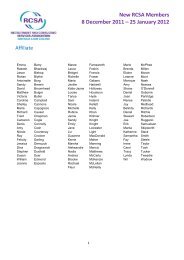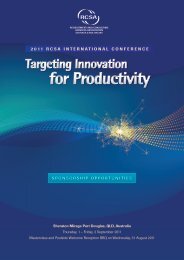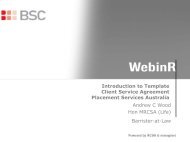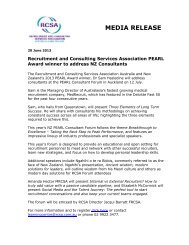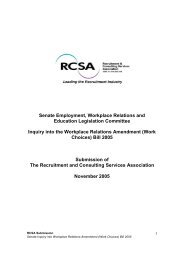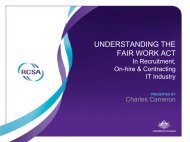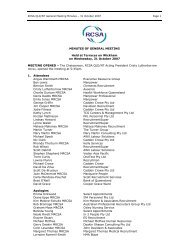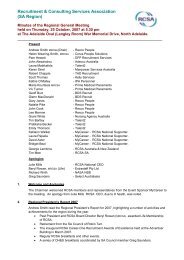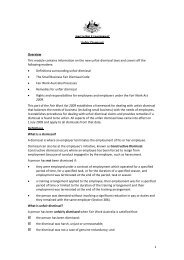June 2012.pdf - RCSA
June 2012.pdf - RCSA
June 2012.pdf - RCSA
You also want an ePaper? Increase the reach of your titles
YUMPU automatically turns print PDFs into web optimized ePapers that Google loves.
BUSINESS MANAGEMENT ISSUES<br />
Imagine if...<br />
New entrants to the workforce<br />
didn’t stay in the same company<br />
for most of their working life,<br />
but instead changed employers<br />
every few years.<br />
There was low<br />
unemployment and it<br />
was hard to find the right<br />
candidates for great jobs.<br />
Graduates from university not<br />
only changed jobs every few years,<br />
but also changed careers several<br />
times during their working life.<br />
Employers, even the big ones like banks<br />
and accounting firms, didn’t always offer<br />
employees the prospect of a long career<br />
and the opportunity to progress through<br />
the ranks to senior positions.<br />
Great workers wanted to have<br />
career breaks and extended travel<br />
breaks and didn’t worry about<br />
being able to get a job when they<br />
were ready to return to the<br />
workforce.<br />
People entered the<br />
workforce with the<br />
aspiration of becoming<br />
a CEO but had no idea<br />
how to get to the top.<br />
Mark Ashburn, General Manager<br />
– Sales, RecruitmentSuper<br />
Imagine if the environment<br />
changed (again!) and<br />
managing careers was more<br />
like being a player-manager<br />
for elite footballers!<br />
Mark Ashburn looks at the<br />
things that have changed –<br />
and the things that haven’t.<br />
OF course, all of these things describe<br />
today’s workforce, but it was only a few<br />
decades ago that most of them would<br />
have sounded far-fetched and fanciful. But<br />
despite the rapid pace of change, which has<br />
turned the way we work almost on its head, our<br />
model for recruitment and career management<br />
largely stay the same: recruiters recruit people<br />
into roles, and then the candidates manage<br />
their own career while they are working.<br />
Sure, a lot of people working today have been<br />
with one company for years, they have stayed<br />
in the same career and worked their way to the<br />
top, by planning their career in conjunction with<br />
thoughtful employers who had a long term vision<br />
for their organisation. But most of these people<br />
are in the later stages of their careers, and will be<br />
20<br />
<strong>RCSA</strong> JOURNAL



